Craig Cliff's Blog, page 18
March 25, 2013
Not saying no / proofs / cover / next
Not saying ‘No’
I received an email the other week asking me to take part in a book-themed funraising event that began:
I was tempted to mark another thing off my to-do list ('Turn something down') but in the end, couldn’t bear the thought of not taking part. So I said yes, but mentioned that if I were them I wouldn’t use that quote again when trying to get writers to donate their time (especially if you strike a writer at the tail-end of a three year project who's very nearly ‘over it’).
*
Proof of life
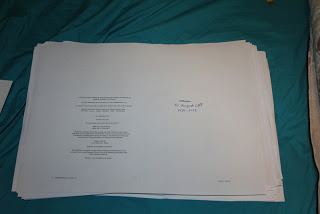 Dedication
Dedication
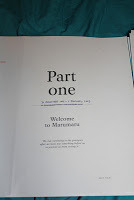 Bung datesLast Tuesday I finished going through the first proofs of The Mannequin Makers. I had some substantive comments to make about the internal design/formatting (no contents page, please; change how sea shanties etc are shown on the page) and caught a few errors (the dates underneath Part One were actually the dates from Part Two; one narrator says they’d never seen their aunty’s diary; later her brother knows it by sight...).
Bung datesLast Tuesday I finished going through the first proofs of The Mannequin Makers. I had some substantive comments to make about the internal design/formatting (no contents page, please; change how sea shanties etc are shown on the page) and caught a few errors (the dates underneath Part One were actually the dates from Part Two; one narrator says they’d never seen their aunty’s diary; later her brother knows it by sight...).
I also cut about 1.5 pages from a section in Part Three (a bit that tended to slow a chapter down and made people wonder about hypothermia).
On Wednesday I got sent some queries from the proof reader who’d been reading the same version of the manuscript (this was their first time with the book). Of the 21 queries, I agreed with 13 and stuck to my guns with the other eight.
Do I have any other comments on the proofs stage?
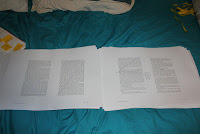 Cut pagesNot really. It’s nice when you first receive the proofs and see your 100k word document laid out as a book and you get to see how many pages it’ll be (around 330 trade paperback pages – ‘around’ since I cut some stuff). From that point, to the time I actually took up the proofs and started reading, was about ten days. It wasn’t reluctance to re-engage with the book (at least, not solely): my gran died, so I had to do funerally things, while still doing long hours at work, filing my column, helping out with the baby and trying to keep a level head on cover issues.
Cut pagesNot really. It’s nice when you first receive the proofs and see your 100k word document laid out as a book and you get to see how many pages it’ll be (around 330 trade paperback pages – ‘around’ since I cut some stuff). From that point, to the time I actually took up the proofs and started reading, was about ten days. It wasn’t reluctance to re-engage with the book (at least, not solely): my gran died, so I had to do funerally things, while still doing long hours at work, filing my column, helping out with the baby and trying to keep a level head on cover issues.
*
The cover
Yeah, so, just remember my headspace wasn’t the best.
About a month ago I was emailed a series of stock photos by Random House and given the chance to veto any images I had an allergic reaction to (I’d previously said I wouldn’t be happy with a ‘women in a flowing dress’ typical historical fiction cover). I vetoed a few.
A week or so later I got a mock-up of a cover that the Sales and Marketing team liked best. I asked to see the other options they were given. I didn’t like any of them. All bar one were stock photos with text on top: two minute photoshop jobs, tops. They looked cold and under-designed. The exception was a more stylised rendering of a dressmaker’s form (not a mannequin), but that looked too much like Chick-Lit.
I tried to put into words what was wrong with the preferred cover. If that image (a headless, limbless mannequin that inspires as much interest in me as a piece of unbuttered toast) must be used, at least do something about the typography.
I also said:
I moved from dislike to acceptance to not giving a damn over the next couple of days.
I know the final call on the cover is not mine to make, and maybe the Sales and Marketing Team knows best (I don’t have enough evidence here to be snarky). And maybe, once there’s a back cover and it’s printed and wrapped around 330-odd pages of literary goodness (or literary passableness) I’ll be fine with it.
*
What’s next?
I get the final proofs after Easter and have another fortnight to turn them around. Final sign-off at the end of April.
I have a grand idea for a launch event but have to talk to some people before I say anything. If this idea falls through I guess it’ll be cheese and pineapple hedgehogs in the Ministry of Education cafeteria. Walk socks and sandals optional.
I received an email the other week asking me to take part in a book-themed funraising event that began:
Woodrow Wilson once said: I would never read a book if it were possible for me to talk half an hour with the man who wrote it.” I am sure there are many who would agree!So, you mean those hundredty-million hours I spent writing my book, and the 5am starts during the editing process (which seems never-ending at the mo) have been a waste? I could have just gone around talking to people? Egad.
I was tempted to mark another thing off my to-do list ('Turn something down') but in the end, couldn’t bear the thought of not taking part. So I said yes, but mentioned that if I were them I wouldn’t use that quote again when trying to get writers to donate their time (especially if you strike a writer at the tail-end of a three year project who's very nearly ‘over it’).
*
Proof of life
 Dedication
Dedication
 Bung datesLast Tuesday I finished going through the first proofs of The Mannequin Makers. I had some substantive comments to make about the internal design/formatting (no contents page, please; change how sea shanties etc are shown on the page) and caught a few errors (the dates underneath Part One were actually the dates from Part Two; one narrator says they’d never seen their aunty’s diary; later her brother knows it by sight...).
Bung datesLast Tuesday I finished going through the first proofs of The Mannequin Makers. I had some substantive comments to make about the internal design/formatting (no contents page, please; change how sea shanties etc are shown on the page) and caught a few errors (the dates underneath Part One were actually the dates from Part Two; one narrator says they’d never seen their aunty’s diary; later her brother knows it by sight...).I also cut about 1.5 pages from a section in Part Three (a bit that tended to slow a chapter down and made people wonder about hypothermia).
On Wednesday I got sent some queries from the proof reader who’d been reading the same version of the manuscript (this was their first time with the book). Of the 21 queries, I agreed with 13 and stuck to my guns with the other eight.
Do I have any other comments on the proofs stage?
 Cut pagesNot really. It’s nice when you first receive the proofs and see your 100k word document laid out as a book and you get to see how many pages it’ll be (around 330 trade paperback pages – ‘around’ since I cut some stuff). From that point, to the time I actually took up the proofs and started reading, was about ten days. It wasn’t reluctance to re-engage with the book (at least, not solely): my gran died, so I had to do funerally things, while still doing long hours at work, filing my column, helping out with the baby and trying to keep a level head on cover issues.
Cut pagesNot really. It’s nice when you first receive the proofs and see your 100k word document laid out as a book and you get to see how many pages it’ll be (around 330 trade paperback pages – ‘around’ since I cut some stuff). From that point, to the time I actually took up the proofs and started reading, was about ten days. It wasn’t reluctance to re-engage with the book (at least, not solely): my gran died, so I had to do funerally things, while still doing long hours at work, filing my column, helping out with the baby and trying to keep a level head on cover issues.*
The cover
Yeah, so, just remember my headspace wasn’t the best.
About a month ago I was emailed a series of stock photos by Random House and given the chance to veto any images I had an allergic reaction to (I’d previously said I wouldn’t be happy with a ‘women in a flowing dress’ typical historical fiction cover). I vetoed a few.
A week or so later I got a mock-up of a cover that the Sales and Marketing team liked best. I asked to see the other options they were given. I didn’t like any of them. All bar one were stock photos with text on top: two minute photoshop jobs, tops. They looked cold and under-designed. The exception was a more stylised rendering of a dressmaker’s form (not a mannequin), but that looked too much like Chick-Lit.
I tried to put into words what was wrong with the preferred cover. If that image (a headless, limbless mannequin that inspires as much interest in me as a piece of unbuttered toast) must be used, at least do something about the typography.
I also said:
“But if I’m honest I would be a little bummed if this is the cover that stares back at me for the next three years (though it may be good motivation to write another book quickly).”This was the day after my gran died, and I apologised for being grumpy in my next email.
I moved from dislike to acceptance to not giving a damn over the next couple of days.
I know the final call on the cover is not mine to make, and maybe the Sales and Marketing Team knows best (I don’t have enough evidence here to be snarky). And maybe, once there’s a back cover and it’s printed and wrapped around 330-odd pages of literary goodness (or literary passableness) I’ll be fine with it.
*
What’s next?
I get the final proofs after Easter and have another fortnight to turn them around. Final sign-off at the end of April.
I have a grand idea for a launch event but have to talk to some people before I say anything. If this idea falls through I guess it’ll be cheese and pineapple hedgehogs in the Ministry of Education cafeteria. Walk socks and sandals optional.
Published on March 25, 2013 10:55
March 3, 2013
Notes on being thoroughly edited
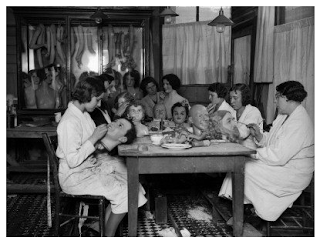 Subtle misdirection: this scene looks nothing like anything in my novel I've recently come out the other side of a rather intensive editing process for my novel, The Mannequin Makers. I didn't go through anything like this with the manuscript for my short story collection. Sure, the freelance editor in that case changed a lot of commas and reformatted things into the house style, but I can only think of two or three meaty queries (a conversation they felt sounded artificial, a child they felt sounded too old, ‘does an oxalis leaf really feel like a dried apricot?’). There were probably a few more, but A Man Melting is pretty much as I wrote it.
Subtle misdirection: this scene looks nothing like anything in my novel I've recently come out the other side of a rather intensive editing process for my novel, The Mannequin Makers. I didn't go through anything like this with the manuscript for my short story collection. Sure, the freelance editor in that case changed a lot of commas and reformatted things into the house style, but I can only think of two or three meaty queries (a conversation they felt sounded artificial, a child they felt sounded too old, ‘does an oxalis leaf really feel like a dried apricot?’). There were probably a few more, but A Man Melting is pretty much as I wrote it.Flash forward three and a half years and I’m in the delivery suite at Wellington Hospital. Labour is progressing slowly (it’ll be another 14 hours before my daughter pops out) and I have time to check my emails. Waiting for me is a message from my new editor saying she’s just read my book, likes it, is excited to work on it, and here are some high level thoughts. Over the next few hours I tinker with a response (one of the suggestions is something I’m dead set against: changing how Part Three is narrated will cause other parts to unravel!) but I don’t end up sending a reply until Lia is a week old.
My editor and I exchanged a couple more emails about high level things (the melodramatic ending, the voice of one of the narrators) and other, more focussed, questions, like ‘Could a Maori be mayor of a town in New Zealand in 1919?’ We came to agreements over these issues and my editor delved into marking up the manuscript line-by-line.
Toward the end of January the ball was back in my court. As I started working through the comments and suggested changes — there were a lot! — I began to wonder if there would be a page in the manuscript that didn’t need changing…
Turns out: no. Not unless you count half-pages at the end of chapters. There were a few pages with only one edit (pages 105, 123 and 144 for those of you playing along at home), and I scrutinised these, hoping I could reject the change and reaffirm the honour of the page, but alas, they were necessary.
Necessary. As in, this book cannot see the light of day until what I wrote (and revised numerous times myself) is changed. Every necessary edit is an admission I am not omniscient. That I could not bring this book to life single-handled.
As I waded deeper into the marked-up manuscript I began to feel as if I’d handed over a flabby mess. A tedious and inexact (what a stellar combo!), overwritten and over-explained, grammatically clumsy and anachronistic eyesore.
Some perspective is needed, of course. It’s the editor’s job to find the errors of fact or taste. It’s not their job to pad my ego. Running through the suggestions in a 105,000 word document, the writer is only seeing the editor’s question marks, never the ticks.
Doing a creative writing workshop teaches you a little about the process of getting feedback, knowing what to take on board and what to stick up for. But editors aren’t paid to use the sandwich technique (open with a compliment, then get to the constructive criticism, close with a compliment). Writers after ego-stroking should not look to the editing process for validation.
 But this dude, he's totally in my novel
But this dude, he's totally in my novel (though not on a bicycle, sadly)Getting edited is a bit like receiving the worst review ever. That one you dream about the night before your book comes out, where someone you respect has mercilessly picked at the minutiae as a way of proving THIS WRITER IS NO GOOD AND NOT WORTH YOUR TIME. There’s no time to talk about the story because there’s so much else wrong with the book. Look, they don’t even know when to use ‘lay’, ‘laid’ or ‘lain’!
But, you remind yourself, this is not a review. There’s still time to make these changes and save face. You convince yourself this, but as with a bad dream, you still carry it round with you the rest of the day — that sense of shame.
As I got further into the manuscript and felt the scales tipping back in my favour (‘I’ve improved the first half of the book... the first three-quarters... the whole book will be better than when I started…’) I felt myself coming to terms with the prospect of bad reviews. ‘Okay,’ I thought, ‘if there’s a pedant out there who picks up a perceived anachronism, so be it. That’s just them trying to prove they read the book closely.’
Sometimes they’ll be wrong, of course (more on this later). But the real hatchet jobs, at least in NZ, are likely to stray wildly from the text and focus on the big issues, like the fact I’m no Franz Kafka and produce McLiterature. This sort of review one can deal with.
So what were some of these necessary changes? And what did I push back on?
Past tension
This was the first time I’ve tried to write anything set in the past, and though I was pleased with what I was able to create and hand over to my publisher late last year, seeing the edits, it’s clear I still have some blind spots. You might say I have a long way to go before I could be considered rigorous in my historical accuracy.
A random example: after my roadtrip around South Canterbury/North Otago in 2011, I was struck by the town halls in places like Palmerston. It took me a long time to figure out what that pebbledash effect was called (rough cast) so that I could mention it in passing in the novel, only for it to be 30 years too soon when I mentioned it in the novel (rough cast was a 1920s thing, but I’d mentioned it in the 1890s).
 I'd have saved us all some time if I'd just
I'd have saved us all some time if I'd just zoomed in on my photo (built 1911)
With things like this, I tssked myself, accepted the change and counted my blessings my editor had picked up the anachronism.
Concrete things like architecture and technology are pretty easy to resolve, but there were quite a few times where my editor questioned how characters talked. Sometimes the criticism was bang on (‘Run them past me,’ ‘big reveal’, ‘Don’t get me started’) and other times I found myself pasting links to Papers Past or Youtube to prove people back then talked or acted like they were talking or acting in my novel.
But that’s not the end of the story. Even if people did talk like that ‘back then’, should they talk like that on the page? There is always a tension between what actually happened and what people think the world was like in a past time. The things people question — were gossip columns so cheeky and forthright? Did they use ‘sunshine’ as a (sarcastic) term of endearment? — are liable to throw readers out of the story EVEN IF it’s historically accurate. A novel is not like a Wikipedia page where you can provide citations and hyperlinks to prove you haven’t made this shit up — well, you have, it’s fiction! — or at least that you haven’t made a historical flub.
On the one hand, I don’t want to throw people out of the story with things that seem anachronistic. But on the other I don’t want to recreate a period based purely on what contemporary readers expect it was like.
A line of dialogue is small biscuits, really. I’d be silly not to change the line to keep reader’s engaged in the story. It’s a novel, after all, not a history book about South Island vernacular 1890-1920.
The issue becomes more fraught when we talk about what the culture was actually like back then. One of the big things I want to get across in the first part of the novel is that urban NZ in 1902 wasn’t the dour, sour, isolated no-fun place many think (the image is more appropriate post-WWI). I didn’t know this myself at the start of the project and didn’t know it would be a subtle but vital part of the first fifty pages of the book – but that happens all the time when writing.
In trying to present this more-vibrant-than-you-might-think world, I’m inviting people to be thrown from the story — is that really what I want to do? My editor pointed out a few things that threw her. She felt particularly thrown by a gossip column that appears in the novel. It was, of course, a fake column from a made-up paper (the Marumaru Mail), but this implag (‘imported plagiarism’) conformed to the tone and style of some of the columns I’d come across while doing my research. After all, I didn’t just come up with the idea of writing a one-off entry of a made-up column in a bawdy style. But when the historical fidelity of such a fake column was questioned, I went back to the real ones I’d read and conceded that the most shocking were in metropolitan weeklies, rather than small town dailies like the Marumaru Mail is supposed to be. So I toned things down slightly, but fought to keep the column in the novel as it’s one way to open a window to the more lively aspect of pre-WWI New Zealand (while also giving readers some relevant info about characters in the novel if they’re prepared to dig/decipher).
A lot of people don’t like implags… I only had about four or five in my manuscript and they all got the “Cut?” from my editor. But I like implags. I think they do a lot of work for a small amount of text, and if pulled off well, add a layer of richness and sense of time to a story. I did let two implags hit the cutting room floor when they weren’t needed as a result of some other changes to the final section, but even that was hard.
Here’s one that got cut:
SUICIDE IN MARUMARUFlorence Pettaway, aged 33, unmarried and living with her brother-in-law near Marumaru, was found hanged in a shed yesterday. The deceased had been melancholy for some days.
This took me a couple of hours to craft these two lines. I needed to research how notices like this were written at the time. Without this piece of reportage, readers will no longer know this character’s last name, her age (though you can work it out), or the way her life would have been essentially dismissed by the newspaper (and, by extension, society). All good, worthy things. But it just didn’t seem right for my not-so-literate narrator to be cutting and pasting from the newspaper. Voice drives form, which leads me to...
Hearing voices
Writers often talk about struggling with a piece until they ‘find the voice’. This is particularly true of first person narrators, of which there are three in my novel. Each time I slogged and slogged and got nowhere until something clicked and the new narrator’s voice became an almost audible presence that carried me forward.
During the editing process, I realised a lot of the things my editor was cleaning up were things I had dictated from this voice. My knee-jerk reaction to a lot of these suggested changes was, ‘But that’s not how Avis/Gabriel/Eugen talks.’ But these voices that arrive are never perfect. Yes, I was able to tap into some part of my unconscious that could do a pretty good facsimile of a bookish sixteen-year-old girl in 1919, but it was only pretty good. Turns out, there was still a lot of 2011/2012 in her voice too, and only someone with fresh eyes (and no mystical voice in her head) can flag the hiccups and the howlers...
This is not to say that I accepted the changes wholesale. I picked my battles and fought for the odd overreached phrase or over-explanation when it’s driven by the character of the narrator (rather than the novelist pushing his own agenda — of which I’m guilty sometimes — or the novelist channelling an imperfect voice he is too stubborn to admit could sound even better).
Tics and idiocy
All writers have tics. Some are thematic. Like how my stories tend to revolve around fathers: artistic fathers, absent fathers, stern fathers, concerned fathers, de facto fathers. I also have some tics at the sentence level, some of which are part of my received Manawatu plains vernacular. Most of the tics that got pulled up in the manuscript for The Mannequin Makers, however, were related to the voices of the narrators inside my head. My editor pointed out how fond I was of ‘atop’, ‘hoisted’, ‘eased’ and the colour orange (for dresses) - all things that, when examined post-mortem, sound slightly antique and more active than ‘on,’ ‘raised’, ‘lowered’, and a more common colour. But, overused, these words lose their value too.
A lot of things were ‘compared to’ others, rather than ‘compared with’. This might be part of my imperfect vernacular and I was happy to revert to the more formal sounding ‘with’.
And then there were the moments of sheer idiocy, like when I wrote ‘descended down the ladder’ and my editor swiftly removed the ‘down’. Phew!
Praise be to editors.
Proof positive
The process of going through my edited manuscript involved a lot more than ironing out the tics and anachronisms. I also rewrote large chunks of the final section to improve the ending and make it all hang together better.
When I sent the manuscript back with my blue edits mixed with my editor’s red ones, our comment balloons cramming the right margin, I felt two things:
One: this manuscript is a frigging mess.
Two: this manuscript is 200% better than the one I sent off a couple of months ago.
In order to reconcile these two impressions, before I hit send I asked myself: is there anything here you wish you could change if you had another week? There were passages I’d have liked to read again with fresh eyes. There were a few changes I wanted to sleep on for another night. But there was nothing more to do just then.
I hit send.
The first proofs are being couriered to me now and I expect to find them waiting for me when I get home from work tonight. I’ve now had the chance to sleep on the changes. I have relatively fresh eyes and the new booky layout of the text should help.
So it’s the start of another few weeks of pouring over my baby before I hand it on to someone else again. All those possible books I could have written when I started with the idea of a mannequin maker and a shipwreck have narrowed to one. All those ‘first’ novels I’ve worked on or daydreamt are about to be trumped by a real first novel. I’m anxious and pleased. I’m ready to bounce from pride to shame at the sight of an errant coma. I’m tired — so tired — but I’m nearly done.
Published on March 03, 2013 10:19
February 13, 2013
It's al(most) over now, baby blue
I sent a Valentines* to my editor today in the form of a revised manuscript for The Mannequin Makers. It was a tough fortnight with too little sleep (baby, book, dayjob), but cycling to work helped keep me sane.
If I can face spending two hours on the computer this weekend I’ll write up my thoughts on the editing process. But not before I drink beer and watch the cricket.
Until then, here’s a playlist:
---
*If you wanna know what I think about 14 Feb, read my Dom Post column from the weekend.
If I can face spending two hours on the computer this weekend I’ll write up my thoughts on the editing process. But not before I drink beer and watch the cricket.
Until then, here’s a playlist:
---
*If you wanna know what I think about 14 Feb, read my Dom Post column from the weekend.
Published on February 13, 2013 22:37
February 2, 2013
January reading summary
I'm up to my eyeballs in edits for The Mannequin Makers at the mo. Working to a deadline while working full time and sleeping if and when my daughter deems it appropriate.
I hope to write a detailed post about the editing process after I'm over this next hump, but until then, let's talk about books by other people!!
January seems to have been a month out of the ordinary for me, with at least three books with fantasy elements (not normally my bag). But it’s always good to wade into different waters.
 Flight by Sherman Alexie (novel, audiobook, US)
Flight by Sherman Alexie (novel, audiobook, US)
I thought for the first hour that it was really good, then it went suddenly and terribly wrong (as in: extended dream sequence lasting ¾ of the book).
 The Night Circus by Erin Morgenstern (novel, audiobook, US)
The Night Circus by Erin Morgenstern (novel, audiobook, US)
I didn’t want to like this book. I didn’t even want to read it, but somehow it wound up on my iPod. The Night Circus has elements of Neil Gaiman, Christopher Priest (the dude who wrote The Prestige, my favourite novel about magic) and Great Expectations. It's engaging to begin with, but poorly structured and drags for long stretches. And personally I favour fiction that tackles illusions rather than actual magic.
 Zoo City by Lauren Beukes (novel, South Africa)
Zoo City by Lauren Beukes (novel, South Africa)
This felt like Elmore Lenard’s Be Cool, transplated into a twisted Johannesburg (and a world where, if you do something really bad, you get saddled with an animal like a sloth or a meerkat). Sadly, Beukes’ writing does not have Lenard’s restraint and I got seriously lost in the climax (as in: where is she now? Where are these other people? How can she hear them and they not see her?).
 Big Country by Louis L’Amour (short stories, audiobook, US)
Big Country by Louis L’Amour (short stories, audiobook, US)
This audiobook contained two longer stories from one of the best selling authors of Western. A bit of sunny, parched-earth fun for Summer – but I was actually quite impressed with L’Amour’s writing: it’s more restrained and smooth than I expected from someone associated with pulp.
 The Ongoing Moment by Geoff Dyer (non-fiction, UK)
The Ongoing Moment by Geoff Dyer (non-fiction, UK)
Interesting discussion of photographic tropes (hands, other photographers). Wildly divergent, often facinating, but by design it’s bitsy and disjointed.
 A Heart So White by Javier Marias (novel, Spain)
A Heart So White by Javier Marias (novel, Spain)
An interesting set-up buried – quite deliberately – beneath over-analysis and naval-gazing. Is it possible to think a book really good and freely admit to having skimmed large amounts? Well?
I hope to write a detailed post about the editing process after I'm over this next hump, but until then, let's talk about books by other people!!
January seems to have been a month out of the ordinary for me, with at least three books with fantasy elements (not normally my bag). But it’s always good to wade into different waters.
 Flight by Sherman Alexie (novel, audiobook, US)
Flight by Sherman Alexie (novel, audiobook, US)I thought for the first hour that it was really good, then it went suddenly and terribly wrong (as in: extended dream sequence lasting ¾ of the book).
 The Night Circus by Erin Morgenstern (novel, audiobook, US)
The Night Circus by Erin Morgenstern (novel, audiobook, US)I didn’t want to like this book. I didn’t even want to read it, but somehow it wound up on my iPod. The Night Circus has elements of Neil Gaiman, Christopher Priest (the dude who wrote The Prestige, my favourite novel about magic) and Great Expectations. It's engaging to begin with, but poorly structured and drags for long stretches. And personally I favour fiction that tackles illusions rather than actual magic.
 Zoo City by Lauren Beukes (novel, South Africa)
Zoo City by Lauren Beukes (novel, South Africa)This felt like Elmore Lenard’s Be Cool, transplated into a twisted Johannesburg (and a world where, if you do something really bad, you get saddled with an animal like a sloth or a meerkat). Sadly, Beukes’ writing does not have Lenard’s restraint and I got seriously lost in the climax (as in: where is she now? Where are these other people? How can she hear them and they not see her?).
 Big Country by Louis L’Amour (short stories, audiobook, US)
Big Country by Louis L’Amour (short stories, audiobook, US)This audiobook contained two longer stories from one of the best selling authors of Western. A bit of sunny, parched-earth fun for Summer – but I was actually quite impressed with L’Amour’s writing: it’s more restrained and smooth than I expected from someone associated with pulp.
 The Ongoing Moment by Geoff Dyer (non-fiction, UK)
The Ongoing Moment by Geoff Dyer (non-fiction, UK)Interesting discussion of photographic tropes (hands, other photographers). Wildly divergent, often facinating, but by design it’s bitsy and disjointed.
 A Heart So White by Javier Marias (novel, Spain)
A Heart So White by Javier Marias (novel, Spain)An interesting set-up buried – quite deliberately – beneath over-analysis and naval-gazing. Is it possible to think a book really good and freely admit to having skimmed large amounts? Well?
Published on February 02, 2013 19:31
January 16, 2013
Names of Danger
I’ve named hundreds over people over the last ten years, all of them fictional. Some felt more alive than others. Then my wife got pregnant and we knew we'd have to name something for realz and 4 LIFE.
As with naming a character in a story or novel, choosing a name for our child involved a mix of general parameters and gut reactions.
Our parameters were:
a) if possible, the name should reflect the Italian heritage of my wife’s family (since the kid would have my distinctly un-Italian surname)
b) the name needs to be easy to pronounce and spell, and not get too mangled by the Kiwi tongue
c) the first name needs to sound okay with “Cliff” – a difficult task with any kind of name, but Italian ones seem particularly unsuited to such an abrupt, concrete surname as mine.
In order to find the baby name El Dorado, my wife and I scoured the internet. Few names of either gender fit all three requirements, and fewer still seemed to meet the gut-check.
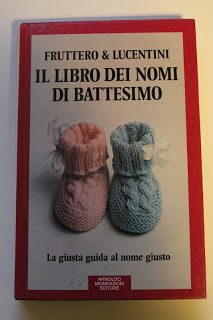 We were then handed a copy of Il Libro Dei Nomi Di Battesimo, a baby name book from 1969 (though our copy was the 1976 edition), all in Italian. My mother-in-law warned us that some of the names may be outdated, but even if we were naming our child the Italian equivalent of Mable or Enid, it’d only be an issue when they travelled to Italy. These things tend to go in cycles anyway.
We were then handed a copy of Il Libro Dei Nomi Di Battesimo, a baby name book from 1969 (though our copy was the 1976 edition), all in Italian. My mother-in-law warned us that some of the names may be outdated, but even if we were naming our child the Italian equivalent of Mable or Enid, it’d only be an issue when they travelled to Italy. These things tend to go in cycles anyway.
The names in the book are divided into sections, such as I nomi dei Santi (The names of the Saints) and La mitologia (mythology). One of the sections was titled I nomi pericolosi, which I translated as “Names of danger” or “Dangerous Names”. I checked with my wife and that was her interpretation too. Even Google Translate agreed.
How cool would it be to have a dangerous name? La Tigre Cliff. Toro (Scatentato) Cliff. Nitroglycerina Cliff.
But the actual names listed in the chapter just seemed to be virtues: Audace (bold), Generoso, Modesto. I guess the danger is if Perfetto doesn't turn out to be perfect. And a couple of the names, like Verecondo (bashful), were hard to imagine belonging to anyone but dwaves.
The real revelation for me, while reading Il Libro Dei Nomi Di Battesimo, was how utterly hideous a lot of Italian names are. Some seemed to mean things after which you wouldn’t normally think of naming a child.
Aracne? You mean, like, “Spider”?
Afrodisio, as in powdered rhino horn? Sei pazzo?
Others, like Gugliemina, are about as aesthetically pleasing as a mildewed drainpipe.
I guess I’d always subscribed to the belief the Romance languages were beautiful and expected all the names to be light and lyrical (the girl names at least). And, as we ended up having a girl, I think it’s important she know how lucky she is that we were mildly discerning and didn’t name her any of these gems from the pages of her Nonna’s book:
Adolfina
Agar
Aldegonda
Amelberga
Bradamante
Calpurnia
Cunegonda
Ediltrude
Edvige
Euterpe
Fannia
Fosca
Fruttuosa
Fulgenzia
Fulvia
Grisvolda
Lutgarde
Mafalda
Marfisa
Ninfa
Norberta
Obdulia
Ombretta
Osvalda
Primitiva
Proba
Publia
Pudenziana
Pulcheria
Pupa
Radegonda
Severa
Sofonisba
Sveva
Ubalda
Ughetta
Ulderica
Urania
Valburga
Wally
My favourite has to be that run of P-names. Maybe one day I’ll write a fairy tale where the heroine has six ugly sisters named Primitiva, Proba, Publia, Pudenziana, Pulceria and Pupa… Pupa. I just love saying that one.
So what did we choose in the end?
Lia.
It’s Italian (check), appearing in the La Bibbia chapter (Bible names: it’s the Italian spelling of Leah). But some websites listed it as also being just the shortened version of names like Rosalia and Angelia. Turns out we both liked short names. And being non-religious this other derivation appealed.
It’s easy to say and sounds okay with Cliff (check, check). Sure, some people may want to spell it Leah, but at least it’s quick to spell out to correct people. Also, very quick to finger spell in NZ Sign Language!
We've already had someone pronounce it Ly-a / Liar, but no name is perfect. (Besides, her daddy does write fiction, so being liberal with the truth ain't the biggest sin.)
I’m sure the time will come when Lia runs home from school crying about the terrible names the boys (who secretly fancy her, how could they not?) have concocted from her name, and hating us, fleetingly, for our oversight.
My reply: “Well dear, you know your mother wanted to call you Ughetta, so you should count yourself lucky!”
As with naming a character in a story or novel, choosing a name for our child involved a mix of general parameters and gut reactions.
Our parameters were:
a) if possible, the name should reflect the Italian heritage of my wife’s family (since the kid would have my distinctly un-Italian surname)
b) the name needs to be easy to pronounce and spell, and not get too mangled by the Kiwi tongue
c) the first name needs to sound okay with “Cliff” – a difficult task with any kind of name, but Italian ones seem particularly unsuited to such an abrupt, concrete surname as mine.
In order to find the baby name El Dorado, my wife and I scoured the internet. Few names of either gender fit all three requirements, and fewer still seemed to meet the gut-check.
 We were then handed a copy of Il Libro Dei Nomi Di Battesimo, a baby name book from 1969 (though our copy was the 1976 edition), all in Italian. My mother-in-law warned us that some of the names may be outdated, but even if we were naming our child the Italian equivalent of Mable or Enid, it’d only be an issue when they travelled to Italy. These things tend to go in cycles anyway.
We were then handed a copy of Il Libro Dei Nomi Di Battesimo, a baby name book from 1969 (though our copy was the 1976 edition), all in Italian. My mother-in-law warned us that some of the names may be outdated, but even if we were naming our child the Italian equivalent of Mable or Enid, it’d only be an issue when they travelled to Italy. These things tend to go in cycles anyway.The names in the book are divided into sections, such as I nomi dei Santi (The names of the Saints) and La mitologia (mythology). One of the sections was titled I nomi pericolosi, which I translated as “Names of danger” or “Dangerous Names”. I checked with my wife and that was her interpretation too. Even Google Translate agreed.
How cool would it be to have a dangerous name? La Tigre Cliff. Toro (Scatentato) Cliff. Nitroglycerina Cliff.
But the actual names listed in the chapter just seemed to be virtues: Audace (bold), Generoso, Modesto. I guess the danger is if Perfetto doesn't turn out to be perfect. And a couple of the names, like Verecondo (bashful), were hard to imagine belonging to anyone but dwaves.
The real revelation for me, while reading Il Libro Dei Nomi Di Battesimo, was how utterly hideous a lot of Italian names are. Some seemed to mean things after which you wouldn’t normally think of naming a child.
Aracne? You mean, like, “Spider”?
Afrodisio, as in powdered rhino horn? Sei pazzo?
Others, like Gugliemina, are about as aesthetically pleasing as a mildewed drainpipe.
I guess I’d always subscribed to the belief the Romance languages were beautiful and expected all the names to be light and lyrical (the girl names at least). And, as we ended up having a girl, I think it’s important she know how lucky she is that we were mildly discerning and didn’t name her any of these gems from the pages of her Nonna’s book:
Adolfina
Agar
Aldegonda
Amelberga
Bradamante
Calpurnia
Cunegonda
Ediltrude
Edvige
Euterpe
Fannia
Fosca
Fruttuosa
Fulgenzia
Fulvia
Grisvolda
Lutgarde
Mafalda
Marfisa
Ninfa
Norberta
Obdulia
Ombretta
Osvalda
Primitiva
Proba
Publia
Pudenziana
Pulcheria
Pupa
Radegonda
Severa
Sofonisba
Sveva
Ubalda
Ughetta
Ulderica
Urania
Valburga
Wally
My favourite has to be that run of P-names. Maybe one day I’ll write a fairy tale where the heroine has six ugly sisters named Primitiva, Proba, Publia, Pudenziana, Pulceria and Pupa… Pupa. I just love saying that one.
So what did we choose in the end?
Lia.
It’s Italian (check), appearing in the La Bibbia chapter (Bible names: it’s the Italian spelling of Leah). But some websites listed it as also being just the shortened version of names like Rosalia and Angelia. Turns out we both liked short names. And being non-religious this other derivation appealed.
It’s easy to say and sounds okay with Cliff (check, check). Sure, some people may want to spell it Leah, but at least it’s quick to spell out to correct people. Also, very quick to finger spell in NZ Sign Language!
We've already had someone pronounce it Ly-a / Liar, but no name is perfect. (Besides, her daddy does write fiction, so being liberal with the truth ain't the biggest sin.)
I’m sure the time will come when Lia runs home from school crying about the terrible names the boys (who secretly fancy her, how could they not?) have concocted from her name, and hating us, fleetingly, for our oversight.
My reply: “Well dear, you know your mother wanted to call you Ughetta, so you should count yourself lucky!”
Published on January 16, 2013 23:36
January 4, 2013
2012 in music
In May I wrote about how the launch of Spotify in New Zealand had aboosted my waning interest in 'new' music. By new music, I don't just mean new bands, but new albums by artists I already liked (or even trawling through artist's back catalogues). My iTunes library had reached critical mass. I had days upon days of songs to listen to, comfortably, familiarly. But Spotify came and made finding new artists as easy as clicking "Start Artist Radio".
So, for the first time since I started blogging in December 2007, I feel like I can do something similar to my annual best books list. This time I'm going to split up my top 11 'new' albums (10 just wasn't enough) into three categories...
You can listen to a track from each album in the following playlist:
Albums released in 2012 by artists that were new to me
Django Django - Django Django (2012)

This album sits alone in this category, because it's so good it deserves this kind of acknowledgement, but also as a lot of the new-to-me bands I listened to and enjoyed (Said the Whale, The Wooden Sky, Immaculate Machine, Margot and the Nuclear So and So's, Local Natives, Hey Rosetta!, Great Lake Swimmers) kind of blurred into one another. Some didn't release a new album in 2012. Some did but I didn't listen to it, or liked an older album better.
Django Django encountered none of these problems, in part because their self-titled album was their debut. But also because it was distinct in its funky fusion of sounds. In some ways, Django Django is a mid-point between my two favourite albums of 2011 (the African-inspired, loopy, mad WHOKILL by Tune-yards and the pop-gospel of the Fleet Foxes' Helplessness Blues).
Albums released in 2012 by artists I'd listened to before
John K. Sampson - Provincial (2012)
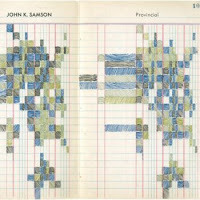
The Weakerthan's frontman's first full length solo album is as good as a full-blown Weakerthans album. It's got great punk-pop songs like 'When I write my masters thesis' and 'Cruise night', and more mellow gems like 'Heart of the continent' and 'Letter in Icelandic from Ninette San'.
A.C. Newman - Shut Down the Streets (2012)
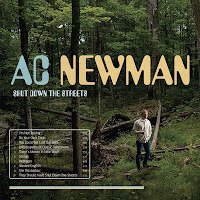
Okay, so 2012 seems to have been the year for solo albums from Canadian frontment. The New Pornographer's Newman also released The Slow Wonder in 2004 which I've listened to quite a lot on Spotify this year. Shut Down the Streets is up to the quality of a New Pornographer's album and features some great songs, none catchier than 'Encyclopedia of Classic Takedowns.'
Cat Power - Sun (2012)

I must confess to never really liking Cat Power that much until this year. But something clicked with Sun. The first three songs on this album were enough to convince me I was in the presence of greatness (more so than simply titling her 2006 album: The Greatest). I haven't gone back through her other albums to see if I've grown into them yet, but there's plenty of time for that.
Neil Young and Crazy Horse - Psychedelic Pill (2012)
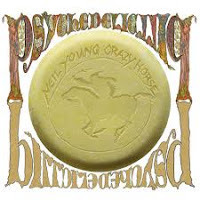
Another Canadian (and kinda solo act). This time, though, I already liked Neil Young. I particularly like his scungy, messy jam records with Crazy Horse and Psychedelic Pill goes out of its way to over-deliver (the opening track. 'Driftin' Back' is 27 minutes long). Sure, there's nothing that new here, but I'll take Neil Young noodling on the guitar and coming back to the mic ever four minutes to get all curmudgeonly any day.
Albums released before 2012 that I didn't listen to until 2012
Desert Noises - Mountain Sea (2011)
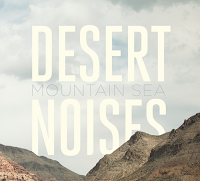
Desert Noises were another new discovery for me in 2012. Like a more straight ahead version of My Morning Jacket, or a less insipid Band of Horses. Desert Noises debut album is a strong one, with 'Your Wolf' being the absolute standout track.
Low - C'mon (2011)
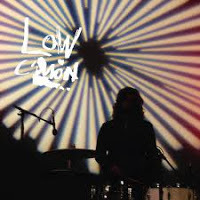
I'd listened to the odd Low track on compilations over the years (they seem to regularly pop up on Uncut's end of year Best Of's) and I must have borrowed 2005's The Great Destroyer from the library at some point, but 2012 was the year I got into Low in a big, big way. When I had three months left until the deadline for my novel, I started listening to Low and three months later I had churned out the required 30,000 words (and edited the whole manuscript a couple of times) and Low was still on heavy rotation. Something similar happened in 2008 when I started listening to the National and wrote like stink.
C'mon gets the nod here because it's their most recent album and it's also bloody great.
Retribution Gospel Choir - Retribution Gospel Choir (2010)
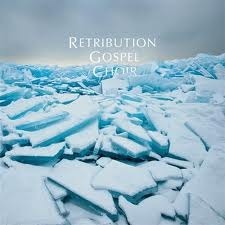
My Low obsession led me swiftly to frontman Alan Sparhawk's collaboration with Mark Kozelek of the Red House Painters and Sun Kil Moon. By the time they came to record their first full length album, Kozelek had stepped down from guitaring duties to act as the producer, but it's still surprising how hard this album rocks, given those involved. Tis a thing of beauty.
Los Lobos - The Town and The City (2006)
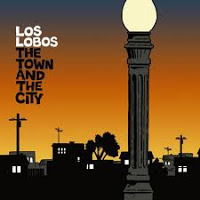
Los Lobos is another band I first encountered on an Uncut Best Of ('Burn it down' on 2010's compilation). Turns out, they also performed 'La Bamba' on the Richie Valen's 1987 biopic (which is still their biggest hit by most metrics). While Los Lobos has been around forever, they've grown into their sound and indie music has grown too, so that this Chicano rock band sounds as fresh and current as any new band with Wolf in their name. The Town and The City is an amazing album from the first track to the last.
Alesandro Escovedo - Street Songs of Love (2010)
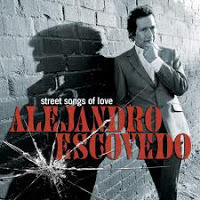
Keep those connections rolling: before 2012 I'd only heard one Escovedo track ('Crooked Frame' on a RYKO compilation I think). Loved the song, never had a chance to delve deeper into his work until Spotify. Like Los Lobos, he's been around a long time. His most recent album, Street Songs of Love is classic Escovedo and sounds like a cross between The Hold Steady, Warren Zevon and, funnily enough, Los Lobos. Great stuff.
Midlake - The Trials of Vanoccupanther (2006)
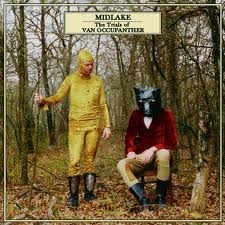
Midlake sounds like Radiohead when they were great (a briefer period than most of my friends are willing to admit) without the respective virtuosity of Jonny Greenwood (guitar) or Thom Yorke (vocals). And with more flute. I preferred this album, Midlake's second (which is sadly no longer available on Spotify) to their more subdued recent outing, The Courage of Others. The album opener, 'Roscoe', is probably my track of the year.
So, for the first time since I started blogging in December 2007, I feel like I can do something similar to my annual best books list. This time I'm going to split up my top 11 'new' albums (10 just wasn't enough) into three categories...
You can listen to a track from each album in the following playlist:
Albums released in 2012 by artists that were new to me
Django Django - Django Django (2012)

This album sits alone in this category, because it's so good it deserves this kind of acknowledgement, but also as a lot of the new-to-me bands I listened to and enjoyed (Said the Whale, The Wooden Sky, Immaculate Machine, Margot and the Nuclear So and So's, Local Natives, Hey Rosetta!, Great Lake Swimmers) kind of blurred into one another. Some didn't release a new album in 2012. Some did but I didn't listen to it, or liked an older album better.
Django Django encountered none of these problems, in part because their self-titled album was their debut. But also because it was distinct in its funky fusion of sounds. In some ways, Django Django is a mid-point between my two favourite albums of 2011 (the African-inspired, loopy, mad WHOKILL by Tune-yards and the pop-gospel of the Fleet Foxes' Helplessness Blues).
Albums released in 2012 by artists I'd listened to before
John K. Sampson - Provincial (2012)

The Weakerthan's frontman's first full length solo album is as good as a full-blown Weakerthans album. It's got great punk-pop songs like 'When I write my masters thesis' and 'Cruise night', and more mellow gems like 'Heart of the continent' and 'Letter in Icelandic from Ninette San'.
A.C. Newman - Shut Down the Streets (2012)

Okay, so 2012 seems to have been the year for solo albums from Canadian frontment. The New Pornographer's Newman also released The Slow Wonder in 2004 which I've listened to quite a lot on Spotify this year. Shut Down the Streets is up to the quality of a New Pornographer's album and features some great songs, none catchier than 'Encyclopedia of Classic Takedowns.'
Cat Power - Sun (2012)

I must confess to never really liking Cat Power that much until this year. But something clicked with Sun. The first three songs on this album were enough to convince me I was in the presence of greatness (more so than simply titling her 2006 album: The Greatest). I haven't gone back through her other albums to see if I've grown into them yet, but there's plenty of time for that.
Neil Young and Crazy Horse - Psychedelic Pill (2012)

Another Canadian (and kinda solo act). This time, though, I already liked Neil Young. I particularly like his scungy, messy jam records with Crazy Horse and Psychedelic Pill goes out of its way to over-deliver (the opening track. 'Driftin' Back' is 27 minutes long). Sure, there's nothing that new here, but I'll take Neil Young noodling on the guitar and coming back to the mic ever four minutes to get all curmudgeonly any day.
Albums released before 2012 that I didn't listen to until 2012
Desert Noises - Mountain Sea (2011)

Desert Noises were another new discovery for me in 2012. Like a more straight ahead version of My Morning Jacket, or a less insipid Band of Horses. Desert Noises debut album is a strong one, with 'Your Wolf' being the absolute standout track.
Low - C'mon (2011)

I'd listened to the odd Low track on compilations over the years (they seem to regularly pop up on Uncut's end of year Best Of's) and I must have borrowed 2005's The Great Destroyer from the library at some point, but 2012 was the year I got into Low in a big, big way. When I had three months left until the deadline for my novel, I started listening to Low and three months later I had churned out the required 30,000 words (and edited the whole manuscript a couple of times) and Low was still on heavy rotation. Something similar happened in 2008 when I started listening to the National and wrote like stink.
C'mon gets the nod here because it's their most recent album and it's also bloody great.
Retribution Gospel Choir - Retribution Gospel Choir (2010)

My Low obsession led me swiftly to frontman Alan Sparhawk's collaboration with Mark Kozelek of the Red House Painters and Sun Kil Moon. By the time they came to record their first full length album, Kozelek had stepped down from guitaring duties to act as the producer, but it's still surprising how hard this album rocks, given those involved. Tis a thing of beauty.
Los Lobos - The Town and The City (2006)

Los Lobos is another band I first encountered on an Uncut Best Of ('Burn it down' on 2010's compilation). Turns out, they also performed 'La Bamba' on the Richie Valen's 1987 biopic (which is still their biggest hit by most metrics). While Los Lobos has been around forever, they've grown into their sound and indie music has grown too, so that this Chicano rock band sounds as fresh and current as any new band with Wolf in their name. The Town and The City is an amazing album from the first track to the last.
Alesandro Escovedo - Street Songs of Love (2010)

Keep those connections rolling: before 2012 I'd only heard one Escovedo track ('Crooked Frame' on a RYKO compilation I think). Loved the song, never had a chance to delve deeper into his work until Spotify. Like Los Lobos, he's been around a long time. His most recent album, Street Songs of Love is classic Escovedo and sounds like a cross between The Hold Steady, Warren Zevon and, funnily enough, Los Lobos. Great stuff.
Midlake - The Trials of Vanoccupanther (2006)

Midlake sounds like Radiohead when they were great (a briefer period than most of my friends are willing to admit) without the respective virtuosity of Jonny Greenwood (guitar) or Thom Yorke (vocals). And with more flute. I preferred this album, Midlake's second (which is sadly no longer available on Spotify) to their more subdued recent outing, The Courage of Others. The album opener, 'Roscoe', is probably my track of the year.
Published on January 04, 2013 18:55
January 2, 2013
Best Reads of 2012
These are the top ten books I read in 2012 (regardless of when they were published).
#1 - The Orphan Master's Son - Adam Johnson
 (2012, novel/audiobook)
(2012, novel/audiobook)
What I said about it in August: "It's a great book... [but] all of the narrative juice is used up before the novel actually closes (about 90% of the way through to be vaguely specific). But I was transported, tempted and entertained. Definitely one of the best books I've consumed this year."
Turns out, time conceals all flaws when it comes to this novel. Certainly the most memorable novel I consumed this year. As always, Numbers 1 through 3 could come in any order depending on my mood.
#2 - True History of the Kelly Gang - Peter Carey
 (2000, novel/audiobook)
(2000, novel/audiobook)
What I said about it in October: "Yeah, this was a good book... The audiobook took a bit of getting used to as the narrator didn't go for much in the way of differentiating characters' voices in dialogue (and decided part way through to make Mary Hearn sound more Irish)...
"But there are advantages of receiving a text like THotKG aurally. Carey's Ned Kelly writes in a comma-less tidal wave, and with the audiobook you have no choice but to keep up with him. Carey's way of breaking up the narrative by describing the various packages that Kelly's account comes in (the conceit is that this true history is archived somewhere in Melbourne) is pretty canny. In fact, the whole thing is canny."
#3 - I Got His Blood on Me - Lawrence Patchett
2012, short stories, NZ)
I never blogged about my own thoughts on this collection, but here's what I said in a Dom Post column from September: "These days, most historical fiction being published in this country features a woman in a flowing dress on the cover, but Patchett's short stories mine a different vein. There are shipwrecks, marathon swimmers and battles between sealers and religious nuts. Costume dress is kept to a minimum.

"The present and the past are allowed to inhabit the same frame, whether it's the ghost of Maud Pember Reeves pestering a council clerk or a musket-wielding time-traveller appearing on the side of State Highway 1. Our past has never felt so exciting or accessible."
And 1: Here's my interview with Lawrence from June.
#4 - The Marriage Plot - Jeffrey Eugenides
 (2012, novel/audiobook)
(2012, novel/audiobook)
What I said about it in June: "I found myself popping my iPod on while doing the dishes or watering the garden, not just during my workday commute, which is always a good sign for my level of engagement with a book.
"For the first time in a while, the American Contemporary Social Realist Novel felt like a genre, and I don’t mean that disparagingly: it felt snug and comforting. Here was the entire spectrum of middle class white college kids in the early eighties (so not much of a spectrum, really) talking about Victorian novelists and literary theory and religion (at other times, the narrator quotes long passages from books on these topics)."
#5 - State of Wonder - Anne Patchett
 (2011, novel/audiobook)
(2011, novel/audiobook)
What I said about it in May: "My current audiobook is Ann Patchett’s State of Wonder, read by Hope Davis. Sadly, Ms Davis struggles with the Australian accent and the first third of the novel features two Australian characters. This small quibble aside, I’m enjoying the book..."
I didn't blog about this novel once I'd finished it, but it was one of the more memorable novels I read this year. Strong plot, clean, unobtrusive writing, with something unnerving running just below the surface.
#6 - Straight through from London: The Antipodes and Bounty Islands, New Zealand - Rowley Taylor
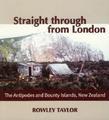 (2007, non-fiction, NZ)
(2007, non-fiction, NZ)
Two years running my #6 spot has been taken by a non-fiction book that I came across while researching THE NOVEL (aka The Mannequin Makers). Taylor's book contains a great mix of general history, stunning colour photos and detailed appendices for those with a special interest in these islands. In particular, his log of every visit by vessels of the NZ Steamer Service was super helpful.
#7 - The Bengal Engine's Mango Afterglow - Geoff Cochrane
 (2012, poetry, NZ)
(2012, poetry, NZ)
I promised a couple of times this year to write about Cochrane's latest collection (and James Brown's, which I brought and read at the same time). But I got busy finishing my novel and, truthfully, I didn't respond to The Bengal Engine's Mango Afterglow as strongly as I had the last few of Cochrane's collections. Several tropes felt recycled. Basho, Li Po and Tu Fu were back. The worksheets were now "Pinksheets" and we got eight of them.
So much of the power of 2010's The Worm in the Tequila derived from the wry twinning of poet's recent diagnosis with diabetes and his alcoholism. He'd also moved from Berhampore to Miramar. For a poet of footpaths and footnotes, this is like a whole new canvas - but it is unfair to expect your favourite poet to get a new disease or colonise a new patch of town with each new collection.
Returning to The Bengal Engine a few months later -- and returning again after that and to Cochrane's other collections (Hypnic Jerks was on particularly high rotation for some reason) -- I got over my initial ambivalence and could see these poems for what they were: photographs from a poet who chooses sound over sight, punctuation over pixels.
#8 - Far from the Madding Crowd - Thomas Hardy
(1874, novel/audiobook)
The oldest entry on this years list by a wide margin, here's what I had to say about it in October: "I felt conditioned to enjoy Far From the Madding Crowd [because I'd recently read The Marriage Plot]. And I did like it.
"I like the way it starts with a very static description of 'Farmer Oak'. I like the way he's had his shot at Bathsheba Everdene early on and the scene where young George drives his sheep off the cliff, reducing him to a shepherd once more.
"...I liked Hardy's authorly theorising about men and women. The sort of things you could never really get away with in a book today. The sort of things quotation pages lap up, but has the habit of jolting the reader from the story..."
#9 - Love and Hydrogen - Jim Shepard
(2004, short stories)
This book features 22 short stories, a number of which appeared in Shepard’s first collection, Batting Against Castro. I really enjoyed Love and Hydrogen, but I’m just gonna come right out and say it: the book is too long...
"Love and Hydrogen may have too many stories, but it surely contains greatness. If not for ‘Ajax [is All About Attack]’, ‘Batting Against Castro’ might be the best sports short story I’ve read. ‘Love and Hydrogen’ might be the best ‘two men in love’ short story I’ve read (and it just so happens to take place on board the Hindenberg).
"The book is lousy with superlative, or near-superlative, stories. And for that reason, I can overlook the overstuffing, the lack of whole-ness, and proclaim it an awesome book."
#10 - How to be a Woman - Caitlin Moran
(2011, non-fiction) The number ten spot this year was tightly contested with a number of novels (Arthur and George, The Keep, The Human Factor, The Art of Fielding and The Forrests) and non-fiction books (The Tipping Point, The Botany of Desire, A Place of My Own, Keith Richards' Life) that were good but not great reads.
The number ten spot this year was tightly contested with a number of novels (Arthur and George, The Keep, The Human Factor, The Art of Fielding and The Forrests) and non-fiction books (The Tipping Point, The Botany of Desire, A Place of My Own, Keith Richards' Life) that were good but not great reads.
So my number ten spot goes to Moran's blend of autobiography and modern manifesto.
Here's what I said about it in November: "I placed a reserve on this book months ago at the library and then when it was finally my time, I was reading it with the eyes of a father-to-be... [What I didn't say: we found out after I'd placed the reserve that we were going to have a girl, so the book took on greater importance].
"Caitlin Moran LIKES TO SHOUT IN CAPS. A LOT. But it works for her. When she wants to, she can turn a great, surprising phrase. Por ejemplo: "I feel embarrassed that she is now having to deal with our secret blackness. This is private. The admin of my soul."
"Interesting. Moderately enlightening. Always entertaining."
***
Target PracticeIn my 2011 end of year reading summary, I noted the following goals for my reading in 2012:
"Read 12 poetry collections (one a month)How'd I do? Only four new collections (not counting re-reading old collections). *Sad trumpet.* "Must try harder next year." "Listen to 12 audiobooks, including at least four non-fiction books."How'd I do? Well, back in May I'd already reached the 12 and 4 mark. All up, I listened to 29 audiobooks, seven of which were non-fiction. A big healthy TICK."Read at least twenty New Zealand books." How'd I do? I only read 16. 80%. That's okay. Maybe next year. "Read at least six Australian books of fiction." How'd I do? Only three. *Sad trumpet*. There's always next year."Read at least six books I already own"How'd I do? Depends if you count books I re-read. Pretty much everything I read this year I bought or got out of the library. So I'm giving myself a fail.2012 was the first year I've ever consumed more audiobooks than physical books (29/26). I blogged about this a couple of times (early starts/tired eyes; most of my reading time being on the way to and from work). I think my Top 10 list this year is a bit middle brow, which is partly due to the fact only so many books I want to read are available as audiobooks. I'm gearing up to listen to Roberto Bolano's 2666 next year, but at 39 hours and 15 minutes, it's kinda daunting.
Some other stats:
What sort of books did I read? Here's a helpful camembert:
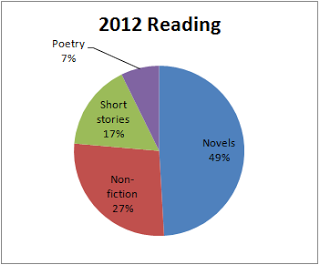
My response: More poetry needed. Novels can go down a bit, surely.
New or old-timey? Here's how the age of these books breaks down:
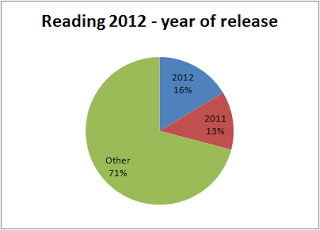
My response: More poetry needed. Novels can go down a bit, surely.
Where did they all come from? Here's how my year looked, based on the country of origin of the authors:
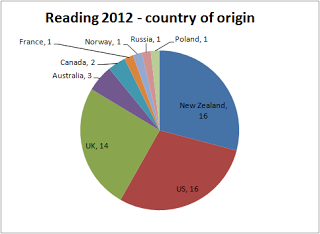
My response: A bit vanilla. Again, audiobook availability may have something to do with this. Next year, I'll try and read books from at least 12 different countries, including 3 countries I've not read anything from before.
What were your best books of 2012? What country must I read in 2013? Lemme know!
#1 - The Orphan Master's Son - Adam Johnson
 (2012, novel/audiobook)
(2012, novel/audiobook)What I said about it in August: "It's a great book... [but] all of the narrative juice is used up before the novel actually closes (about 90% of the way through to be vaguely specific). But I was transported, tempted and entertained. Definitely one of the best books I've consumed this year."
Turns out, time conceals all flaws when it comes to this novel. Certainly the most memorable novel I consumed this year. As always, Numbers 1 through 3 could come in any order depending on my mood.
#2 - True History of the Kelly Gang - Peter Carey
 (2000, novel/audiobook)
(2000, novel/audiobook)What I said about it in October: "Yeah, this was a good book... The audiobook took a bit of getting used to as the narrator didn't go for much in the way of differentiating characters' voices in dialogue (and decided part way through to make Mary Hearn sound more Irish)...
"But there are advantages of receiving a text like THotKG aurally. Carey's Ned Kelly writes in a comma-less tidal wave, and with the audiobook you have no choice but to keep up with him. Carey's way of breaking up the narrative by describing the various packages that Kelly's account comes in (the conceit is that this true history is archived somewhere in Melbourne) is pretty canny. In fact, the whole thing is canny."
#3 - I Got His Blood on Me - Lawrence Patchett
2012, short stories, NZ)
I never blogged about my own thoughts on this collection, but here's what I said in a Dom Post column from September: "These days, most historical fiction being published in this country features a woman in a flowing dress on the cover, but Patchett's short stories mine a different vein. There are shipwrecks, marathon swimmers and battles between sealers and religious nuts. Costume dress is kept to a minimum.

"The present and the past are allowed to inhabit the same frame, whether it's the ghost of Maud Pember Reeves pestering a council clerk or a musket-wielding time-traveller appearing on the side of State Highway 1. Our past has never felt so exciting or accessible."
And 1: Here's my interview with Lawrence from June.
#4 - The Marriage Plot - Jeffrey Eugenides
 (2012, novel/audiobook)
(2012, novel/audiobook)What I said about it in June: "I found myself popping my iPod on while doing the dishes or watering the garden, not just during my workday commute, which is always a good sign for my level of engagement with a book.
"For the first time in a while, the American Contemporary Social Realist Novel felt like a genre, and I don’t mean that disparagingly: it felt snug and comforting. Here was the entire spectrum of middle class white college kids in the early eighties (so not much of a spectrum, really) talking about Victorian novelists and literary theory and religion (at other times, the narrator quotes long passages from books on these topics)."
#5 - State of Wonder - Anne Patchett
 (2011, novel/audiobook)
(2011, novel/audiobook)What I said about it in May: "My current audiobook is Ann Patchett’s State of Wonder, read by Hope Davis. Sadly, Ms Davis struggles with the Australian accent and the first third of the novel features two Australian characters. This small quibble aside, I’m enjoying the book..."
I didn't blog about this novel once I'd finished it, but it was one of the more memorable novels I read this year. Strong plot, clean, unobtrusive writing, with something unnerving running just below the surface.
#6 - Straight through from London: The Antipodes and Bounty Islands, New Zealand - Rowley Taylor
 (2007, non-fiction, NZ)
(2007, non-fiction, NZ)Two years running my #6 spot has been taken by a non-fiction book that I came across while researching THE NOVEL (aka The Mannequin Makers). Taylor's book contains a great mix of general history, stunning colour photos and detailed appendices for those with a special interest in these islands. In particular, his log of every visit by vessels of the NZ Steamer Service was super helpful.
#7 - The Bengal Engine's Mango Afterglow - Geoff Cochrane
 (2012, poetry, NZ)
(2012, poetry, NZ)I promised a couple of times this year to write about Cochrane's latest collection (and James Brown's, which I brought and read at the same time). But I got busy finishing my novel and, truthfully, I didn't respond to The Bengal Engine's Mango Afterglow as strongly as I had the last few of Cochrane's collections. Several tropes felt recycled. Basho, Li Po and Tu Fu were back. The worksheets were now "Pinksheets" and we got eight of them.
So much of the power of 2010's The Worm in the Tequila derived from the wry twinning of poet's recent diagnosis with diabetes and his alcoholism. He'd also moved from Berhampore to Miramar. For a poet of footpaths and footnotes, this is like a whole new canvas - but it is unfair to expect your favourite poet to get a new disease or colonise a new patch of town with each new collection.
Returning to The Bengal Engine a few months later -- and returning again after that and to Cochrane's other collections (Hypnic Jerks was on particularly high rotation for some reason) -- I got over my initial ambivalence and could see these poems for what they were: photographs from a poet who chooses sound over sight, punctuation over pixels.
#8 - Far from the Madding Crowd - Thomas Hardy
(1874, novel/audiobook)

The oldest entry on this years list by a wide margin, here's what I had to say about it in October: "I felt conditioned to enjoy Far From the Madding Crowd [because I'd recently read The Marriage Plot]. And I did like it.
"I like the way it starts with a very static description of 'Farmer Oak'. I like the way he's had his shot at Bathsheba Everdene early on and the scene where young George drives his sheep off the cliff, reducing him to a shepherd once more.
"...I liked Hardy's authorly theorising about men and women. The sort of things you could never really get away with in a book today. The sort of things quotation pages lap up, but has the habit of jolting the reader from the story..."
#9 - Love and Hydrogen - Jim Shepard
(2004, short stories)

This book features 22 short stories, a number of which appeared in Shepard’s first collection, Batting Against Castro. I really enjoyed Love and Hydrogen, but I’m just gonna come right out and say it: the book is too long...
"Love and Hydrogen may have too many stories, but it surely contains greatness. If not for ‘Ajax [is All About Attack]’, ‘Batting Against Castro’ might be the best sports short story I’ve read. ‘Love and Hydrogen’ might be the best ‘two men in love’ short story I’ve read (and it just so happens to take place on board the Hindenberg).
"The book is lousy with superlative, or near-superlative, stories. And for that reason, I can overlook the overstuffing, the lack of whole-ness, and proclaim it an awesome book."
#10 - How to be a Woman - Caitlin Moran
(2011, non-fiction)
 The number ten spot this year was tightly contested with a number of novels (Arthur and George, The Keep, The Human Factor, The Art of Fielding and The Forrests) and non-fiction books (The Tipping Point, The Botany of Desire, A Place of My Own, Keith Richards' Life) that were good but not great reads.
The number ten spot this year was tightly contested with a number of novels (Arthur and George, The Keep, The Human Factor, The Art of Fielding and The Forrests) and non-fiction books (The Tipping Point, The Botany of Desire, A Place of My Own, Keith Richards' Life) that were good but not great reads. So my number ten spot goes to Moran's blend of autobiography and modern manifesto.
Here's what I said about it in November: "I placed a reserve on this book months ago at the library and then when it was finally my time, I was reading it with the eyes of a father-to-be... [What I didn't say: we found out after I'd placed the reserve that we were going to have a girl, so the book took on greater importance].
"Caitlin Moran LIKES TO SHOUT IN CAPS. A LOT. But it works for her. When she wants to, she can turn a great, surprising phrase. Por ejemplo: "I feel embarrassed that she is now having to deal with our secret blackness. This is private. The admin of my soul."
"Interesting. Moderately enlightening. Always entertaining."
***
Target PracticeIn my 2011 end of year reading summary, I noted the following goals for my reading in 2012:
"Read 12 poetry collections (one a month)How'd I do? Only four new collections (not counting re-reading old collections). *Sad trumpet.* "Must try harder next year." "Listen to 12 audiobooks, including at least four non-fiction books."How'd I do? Well, back in May I'd already reached the 12 and 4 mark. All up, I listened to 29 audiobooks, seven of which were non-fiction. A big healthy TICK."Read at least twenty New Zealand books." How'd I do? I only read 16. 80%. That's okay. Maybe next year. "Read at least six Australian books of fiction." How'd I do? Only three. *Sad trumpet*. There's always next year."Read at least six books I already own"How'd I do? Depends if you count books I re-read. Pretty much everything I read this year I bought or got out of the library. So I'm giving myself a fail.2012 was the first year I've ever consumed more audiobooks than physical books (29/26). I blogged about this a couple of times (early starts/tired eyes; most of my reading time being on the way to and from work). I think my Top 10 list this year is a bit middle brow, which is partly due to the fact only so many books I want to read are available as audiobooks. I'm gearing up to listen to Roberto Bolano's 2666 next year, but at 39 hours and 15 minutes, it's kinda daunting.
Some other stats:
What sort of books did I read? Here's a helpful camembert:

My response: More poetry needed. Novels can go down a bit, surely.
New or old-timey? Here's how the age of these books breaks down:

My response: More poetry needed. Novels can go down a bit, surely.
Where did they all come from? Here's how my year looked, based on the country of origin of the authors:

My response: A bit vanilla. Again, audiobook availability may have something to do with this. Next year, I'll try and read books from at least 12 different countries, including 3 countries I've not read anything from before.
What were your best books of 2012? What country must I read in 2013? Lemme know!
Published on January 02, 2013 20:25
January 1, 2013
Plus Ones / New Office / Yellow pohutukawa

So here we are. A new year, a new outlook on life. Mine is courtesy of the two week old screaming in the next room. I'm now a dab hand at changing nappies and ghosting through life with bloodshot eyes. Going back to work next Monday will be fun. Blogging, writing fiction and such luxuries may be infrequent this year. But hey, I have a daughter. Life is good.
*
*
This is where it all happens, part V
The new arrival has neccisitated a reshuffle at the Cliff household. My brother moved out of the third bedroom a couple of months ago. Now I've moved my office into his old room and my old office is now the baby's room (for some reason I feel like stabbing people who call it a nursery, not sure why).
So this is what my writing space looks like these days...

I don't have the same view of the hills (and the seagulls going to and from the dump), but the deck's just there. On sunny, calm days I can pretend I'm writing al fresco.
As an added bonus, there's a fridge in the wardrobe which wasn't stocked when I took this photo but I can assure you it is now!

You can perve at my previous working spaces here (Edinburgh I), here (Edinburgh II), here (Houghton Bay) and here (Kingston I).
Nice surprises
We moved into this house in March 2012 and I only discovered that the pohutukawa above our place was a yellow one on 22 December.

It just so happened I was carrying my daughter inside for the first time, so it was rather auspicious.

A couple of days later I noticed the first head on our artichoke.

2012 was a fruitful year. One human baby delivered, one book baby handed to an editor, one house bought, one promotion and the promise of stuffed artichoke in a week or two.
Next steps
Tomorrow I'll post my annual Best Books I Read Last Year post. There's actually four books published in 2012 on the list, and two from 2011, so it's a bit more current than some other year's top tens.
Until tomorrow, you can read my lists for 2011, 2010 and 2008.
And the day after tomorrow I'll post a similar list for music. It'll be the first time I've done this, which says something for my consumption of new (to me) music, compared to the iTunes funk I'd gotten into in recent years. Mostly thanks to Spotify.
Till then, here's a picture of a windmill at Makara, looking north to Mana Island.

Published on January 01, 2013 21:24
December 11, 2012
Abide with the handmaid’s desire: recent reading
I totted up my reading for the year this morning and there were about eight books jostling for the ninth and tenth spots on my top ten reads of the year. So I’ve decided to leave it another week and see if I don’t stumble on something that can leapfrog these ‘good, but’ books.
Until then, here’s what I’ve been reading of late...
Abide with me by Elizabeth Strout (novel, audiobook)
 Strout’s 2006 novel reminded me of Marilynne Robinson’s 2004 novel Gilead: small town America in the 1950s, church ministers at their centre... But Abide with Me is colder, less lustrous. No doubt this is in part due to the contrast between Tyler Caskey’s New England Protestantism and John Ames’ Midwestern Congregationalism. In Strout’s next book, Olive Kitteridge, she finds a way to turn this bitterness into something compelling (see the title character; the novel in stories structure helps too), but Abide with Me is no Olive Kitteridge.
Strout’s 2006 novel reminded me of Marilynne Robinson’s 2004 novel Gilead: small town America in the 1950s, church ministers at their centre... But Abide with Me is colder, less lustrous. No doubt this is in part due to the contrast between Tyler Caskey’s New England Protestantism and John Ames’ Midwestern Congregationalism. In Strout’s next book, Olive Kitteridge, she finds a way to turn this bitterness into something compelling (see the title character; the novel in stories structure helps too), but Abide with Me is no Olive Kitteridge.
The Handmaid’s Taleby Margaret Atwood (novel, audiobook)
 I spent the first half of this dystopian novel thinking: if this was really a dystopian novel something would be happening right now. Of course, the quid pro quo of a real dystopian novel (read: genre fiction) is less character development, less controlled writing (and less acclaim for its author). Things pick up eventually — we even get the staple of the genre: a long, thinly disguised information download to explain how things got so... dystopic. And hey, I wasn’t complaining. All up, I liked the book, but at this point in time I might have liked it more if the needle moved a notch or two back towards genre.
I spent the first half of this dystopian novel thinking: if this was really a dystopian novel something would be happening right now. Of course, the quid pro quo of a real dystopian novel (read: genre fiction) is less character development, less controlled writing (and less acclaim for its author). Things pick up eventually — we even get the staple of the genre: a long, thinly disguised information download to explain how things got so... dystopic. And hey, I wasn’t complaining. All up, I liked the book, but at this point in time I might have liked it more if the needle moved a notch or two back towards genre.
The Botany of Desireby Michael Pollan (non-fiction, audiobook)
 This is the second Pollan book I've listened to this year after
A Place of My Own
. This one delves into the history of the apple, the tulip, cannabis and the potato to tell the story of how humans have changed plants and how we might have actually been doing the plants’ bidding. There was plenty of interesting stuff (I didn’t know that all commercial apple varieties are grown from clones rather than from seed; I’d never heard of Tulipomania), though each section seemed to lose momentum three-quarters of the way in and the wheels were allowed to spin to fill the page-count or hammer home Pollan’s thesis.
This is the second Pollan book I've listened to this year after
A Place of My Own
. This one delves into the history of the apple, the tulip, cannabis and the potato to tell the story of how humans have changed plants and how we might have actually been doing the plants’ bidding. There was plenty of interesting stuff (I didn’t know that all commercial apple varieties are grown from clones rather than from seed; I’d never heard of Tulipomania), though each section seemed to lose momentum three-quarters of the way in and the wheels were allowed to spin to fill the page-count or hammer home Pollan’s thesis. 
Until then, here’s what I’ve been reading of late...
Abide with me by Elizabeth Strout (novel, audiobook)
 Strout’s 2006 novel reminded me of Marilynne Robinson’s 2004 novel Gilead: small town America in the 1950s, church ministers at their centre... But Abide with Me is colder, less lustrous. No doubt this is in part due to the contrast between Tyler Caskey’s New England Protestantism and John Ames’ Midwestern Congregationalism. In Strout’s next book, Olive Kitteridge, she finds a way to turn this bitterness into something compelling (see the title character; the novel in stories structure helps too), but Abide with Me is no Olive Kitteridge.
Strout’s 2006 novel reminded me of Marilynne Robinson’s 2004 novel Gilead: small town America in the 1950s, church ministers at their centre... But Abide with Me is colder, less lustrous. No doubt this is in part due to the contrast between Tyler Caskey’s New England Protestantism and John Ames’ Midwestern Congregationalism. In Strout’s next book, Olive Kitteridge, she finds a way to turn this bitterness into something compelling (see the title character; the novel in stories structure helps too), but Abide with Me is no Olive Kitteridge. The Handmaid’s Taleby Margaret Atwood (novel, audiobook)
 I spent the first half of this dystopian novel thinking: if this was really a dystopian novel something would be happening right now. Of course, the quid pro quo of a real dystopian novel (read: genre fiction) is less character development, less controlled writing (and less acclaim for its author). Things pick up eventually — we even get the staple of the genre: a long, thinly disguised information download to explain how things got so... dystopic. And hey, I wasn’t complaining. All up, I liked the book, but at this point in time I might have liked it more if the needle moved a notch or two back towards genre.
I spent the first half of this dystopian novel thinking: if this was really a dystopian novel something would be happening right now. Of course, the quid pro quo of a real dystopian novel (read: genre fiction) is less character development, less controlled writing (and less acclaim for its author). Things pick up eventually — we even get the staple of the genre: a long, thinly disguised information download to explain how things got so... dystopic. And hey, I wasn’t complaining. All up, I liked the book, but at this point in time I might have liked it more if the needle moved a notch or two back towards genre.The Botany of Desireby Michael Pollan (non-fiction, audiobook)
 This is the second Pollan book I've listened to this year after
A Place of My Own
. This one delves into the history of the apple, the tulip, cannabis and the potato to tell the story of how humans have changed plants and how we might have actually been doing the plants’ bidding. There was plenty of interesting stuff (I didn’t know that all commercial apple varieties are grown from clones rather than from seed; I’d never heard of Tulipomania), though each section seemed to lose momentum three-quarters of the way in and the wheels were allowed to spin to fill the page-count or hammer home Pollan’s thesis.
This is the second Pollan book I've listened to this year after
A Place of My Own
. This one delves into the history of the apple, the tulip, cannabis and the potato to tell the story of how humans have changed plants and how we might have actually been doing the plants’ bidding. There was plenty of interesting stuff (I didn’t know that all commercial apple varieties are grown from clones rather than from seed; I’d never heard of Tulipomania), though each section seemed to lose momentum three-quarters of the way in and the wheels were allowed to spin to fill the page-count or hammer home Pollan’s thesis.
Published on December 11, 2012 21:00
December 10, 2012
'Welcome to What Next, Population: You'
I’ve been MIA for the last couple of weeks. No, the baby hasn’t come yet (due date is tomorrow: 12/12/12, which was always too perfect to ever happen; I’m just hoping it doesn’t arrive too close to Christmas).
But I have delivered my other baby (for the second time).
Last Tuesday I sent The Mannequin Makers back to my publisher after spending two months making some tweaks, thanks to the useful feedback I received.
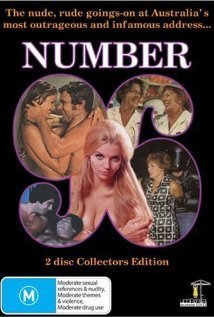 (In truth, I spent the first month watching Australian TV shows from the 1970s on YouTube -- Number 96, The Paul Hogan Show, The Great Temptation -- which was a research dead end. Even at this late stage, it isn’t always clear what belongs in a book and what doesn’t.)
(In truth, I spent the first month watching Australian TV shows from the 1970s on YouTube -- Number 96, The Paul Hogan Show, The Great Temptation -- which was a research dead end. Even at this late stage, it isn’t always clear what belongs in a book and what doesn’t.)
Now the manuscript is with an editor who I’m excited to work with. Maybe it’s the masochist in me, but I enjoy this process of giving my baby over to someone else and letting them cover it in red ink, this game of manuscript tennis that eats up month after month. So long as you don’t forget who you are and what you set out to write, you’ll make the right changes, lessen the areas readers can get mired, lost, annoyed, or misled and amp up those moments you always thought should sing but maybe never quite nailed.
Every new version is an improvement on the last. Every new version is an improvement on the last. Every new version is an improvement on the last.
Maybe, by the end of this, we will have a book that some readers read through to the final page. Maybe some will like it, steal it from the library, name their children after its characters… Maybe it will annoy great swathes of people, get thrown across drawing rooms (I don’t think my target market has ‘drawing rooms’…), prompt lengthy ad hominen blog posts and snarky tweets. Maybe it will sink like a stone next year and I will be too busy fathering a real baby to notice. Maybe I will be juggling a real baby and another book-baby.
At this stage, I cannot say – not because I am being coy, but because I do not know.
I have entered the territory of ‘What Next?’ I have no map. I don’t speak the language here. Maybe I do, but I speak it poorly and when I ask the locals for directions they turn their noses up at me and walk away.
Deciding on your next project is a lot like your first week in Paris. You’re busy, confused, bumbling. Embarrassment is there to meet you at every turn. You’re surrounded by houses with plaques declaring the famous writers who’ve lived there. They’ve made their name, staked their claim. There’s nothing for you here, move along.
But eventually you will find that small café down an alley the other tourists don’t seem to notice. A place where the waiters humour your mangled recitation of the menu. A place to sit and let the world come to you. To get to know the regulars and the pigeons, the bitter kick of the coffee, the quiet hour after lunch when the wind toys with the morning’s newspapers.
Soon it will feel like home, this place. It will be knowable. Your knowledge of it will become comprehensive, then godlike, omniscient. You will use this knowledge to toy with the regulars, the pigeons, the headlines on the morning papers – petty games, but it keeps you occupied.
And then, one day, you are done with this place and it’s time to move on. It’s off to the airport and another foreign city, another busy, confused, bumbling week, or month or year.
As you lie on another lumpy hostel mattress, you tell yourself: next time I will read the travel guides in advance. Next time I’ll take language lessons beforehand. Next time I will draw up an itinerary and stick to it.
Or maybe you’ll just write short stories…

But I have delivered my other baby (for the second time).
Last Tuesday I sent The Mannequin Makers back to my publisher after spending two months making some tweaks, thanks to the useful feedback I received.
 (In truth, I spent the first month watching Australian TV shows from the 1970s on YouTube -- Number 96, The Paul Hogan Show, The Great Temptation -- which was a research dead end. Even at this late stage, it isn’t always clear what belongs in a book and what doesn’t.)
(In truth, I spent the first month watching Australian TV shows from the 1970s on YouTube -- Number 96, The Paul Hogan Show, The Great Temptation -- which was a research dead end. Even at this late stage, it isn’t always clear what belongs in a book and what doesn’t.)Now the manuscript is with an editor who I’m excited to work with. Maybe it’s the masochist in me, but I enjoy this process of giving my baby over to someone else and letting them cover it in red ink, this game of manuscript tennis that eats up month after month. So long as you don’t forget who you are and what you set out to write, you’ll make the right changes, lessen the areas readers can get mired, lost, annoyed, or misled and amp up those moments you always thought should sing but maybe never quite nailed.
Every new version is an improvement on the last. Every new version is an improvement on the last. Every new version is an improvement on the last.
Maybe, by the end of this, we will have a book that some readers read through to the final page. Maybe some will like it, steal it from the library, name their children after its characters… Maybe it will annoy great swathes of people, get thrown across drawing rooms (I don’t think my target market has ‘drawing rooms’…), prompt lengthy ad hominen blog posts and snarky tweets. Maybe it will sink like a stone next year and I will be too busy fathering a real baby to notice. Maybe I will be juggling a real baby and another book-baby.
At this stage, I cannot say – not because I am being coy, but because I do not know.
I have entered the territory of ‘What Next?’ I have no map. I don’t speak the language here. Maybe I do, but I speak it poorly and when I ask the locals for directions they turn their noses up at me and walk away.
Deciding on your next project is a lot like your first week in Paris. You’re busy, confused, bumbling. Embarrassment is there to meet you at every turn. You’re surrounded by houses with plaques declaring the famous writers who’ve lived there. They’ve made their name, staked their claim. There’s nothing for you here, move along.
But eventually you will find that small café down an alley the other tourists don’t seem to notice. A place where the waiters humour your mangled recitation of the menu. A place to sit and let the world come to you. To get to know the regulars and the pigeons, the bitter kick of the coffee, the quiet hour after lunch when the wind toys with the morning’s newspapers.
Soon it will feel like home, this place. It will be knowable. Your knowledge of it will become comprehensive, then godlike, omniscient. You will use this knowledge to toy with the regulars, the pigeons, the headlines on the morning papers – petty games, but it keeps you occupied.
And then, one day, you are done with this place and it’s time to move on. It’s off to the airport and another foreign city, another busy, confused, bumbling week, or month or year.
As you lie on another lumpy hostel mattress, you tell yourself: next time I will read the travel guides in advance. Next time I’ll take language lessons beforehand. Next time I will draw up an itinerary and stick to it.
Or maybe you’ll just write short stories…
Published on December 10, 2012 21:59



